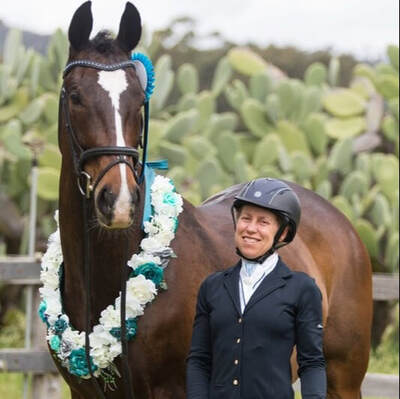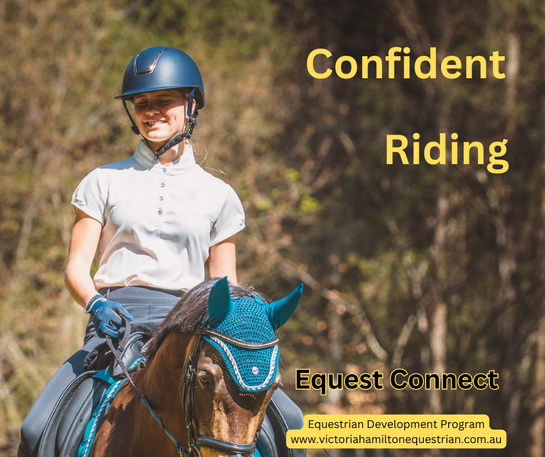|
3/15/2023 0 Comments Confident RidingMost people think of a confident rider as someone who is not scared of falling off - a very good (and important) start! However, the word “confident” can be used in many different contexts when discussing riding.
Con-fi-dent - to be certain in one’s abilities People learning to ride or returning to riding after a break or injury may well question their ability to stay with the horse should something unpredictable happen. This is very common, easy to recognise and totally understandable. Fortunately there is a lot you can do to increase your confidence which I will discuss later in this blog. Two areas riders may not be aware their lack of confidence is creating an issue is in training and competing. If riders are not 100% sure that what and how they are asking is correct, they may second guess themselves and take an aid off too early or bring in a backup aid too soon. Both scenarios could confuse the horse and in many cases the riders are not even aware that this is happening. These are such interesting topics that I will dedicate a blog to each in the near future, as well as one about confidence in horses and how we can help them develop this. What can you do to be as confident as possible when riding? 1) Keep as fit and supple as you can. Not only will your horse thank you for this but so will your body the day after riding or if you are unlucky enough to have a fall! Good riders are not just lucky to be good. Most are always working on their own bodies to be the very best riders that they can be. Not living with your horse or lack of riding hours is no longer an acceptable excuse as there are so many online programs dedicated to rider fitness that are readily accessible to everyone. 2) Be sensible. Don’t ride if you are feeling really tired or unwell or perhaps just go for a walk instead. Anything that affects your balance and reaction times will make you feel more vulnerable and therefore less confident. 3) Learn about your horse. Everything. And more! You can never learn too much. Both about horses in general and about your own, individual horse. What is he/she like after time off, in different environments such as indoors, outdoors, on the train, in wind, in company, alone. Learn all about horse welfare, common management issues that can result in behavioural signs in ridden horses such as ulcers and lamenesses, seasonal issues such as grass related problems - The list is endless! 4) Have tack that fits you and your horse. Fitting your horse is obvious, or at least it should be. No horse should have to be ridden in tack that doesn’t suit them and good on them for bucking or resisting if this is the case. But rider fit is also as important. A rider will be insecure in a saddle that is too big for them as well as one that is too small as they won’t be able to get into the deepest part of the seat and will always be perched on top. Of equal importance is the balance of the saddle or else the rider will be forever struggling to stay upright and with the movement. Sometimes until you have sat in different saddles you don’t know what a difference this can truly make. 5) Know your limitations. If you have only ever ridden older school master horses, don’t try to break in your next horse by yourself. You may be lucky but there is a very good chance you won’t. 6) Don’t try to be a hero – get help when needed or just wait! If your horse has started doing something that worries you then ask for advice. There will never be any harm in doing this but could well be if you don’t. 7) Learn from others’ mistakes. This is much less painful and less heartbreaking than actually making them yourself! 8) Be prepared, try to foresee possible potential non favourable outcomes and plan strategies to cope with these. An example here is to not take a highly strung horse out to a new place when it has not been worked for a while. No-one will thank you for this. Certainly not your coach nor fellow pupils. Or if you arrive somewhere and your horse is really uptight, don’t get on. No-one says you have to and quite often some ground work first, or perhaps only ground work, may be the way to go. 9) Have regular lessons. Don’t cancel if you are unwell or if your horse is out of action. Be inventive with your coach and do in-hand or online theory lessons. Unless you know more than me (and even I am continually updating) you will always have more to learn. 10) Seek help from a psychologist if you are nervous from a previous fall or bad experience and are unable to work through this with your current support team. Likewise if your riding anxiety is trickling over from general life situations. The Rider Aware and Rider Balance clinics of the Equest Connect Program really help riders become more secure in the saddle leading to an increase in riding confidence. Improving balance enables riders to use less muscular tension and therefore be able to feel more of what the horse is doing underneath them, give lighter aids at the correct time and be more in tune with their horse. Above all they are incredibly good fun!
0 Comments
Leave a Reply. |
AuthorDr Victoria Hamilton is an icon in the Australian Equestrian Community, with a wealth of experience as a veterinarian, coach, breeder and international dressage competitor. As one of Australia’s top dressage riders, her love of horses is contagious and apparent in everything she does. Archives
February 2024
Categories |


 RSS Feed
RSS Feed